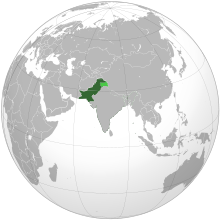Pakistan And The Haqqani Network – Analysis
By IPCS
By Anindya Batabyal
In spite of a considerable amount of international pressure being mounted on Pakistan to act against the various terror groups that operate from within its territory, the Pakistani government, particularly the army and the ISI, is reluctant to act against groups like the Haqqani network. This stems from certain political and strategic reasons which need to be analyzed. Relations between the US and Pakistan have been fragile for quite sometime. It has deteriorated even further after last month’s attack on the US embassy in Kabul, carried out by militants of the Taliban-affiliated Haqqani network. Earlier, the killing of al Qaeda chief Osama bin Laden inside the Pakistani city of Abbottabad by US special operation forces commandos on 2 May 2011 created more fault lines in an already uneasy and delicate relationship. The incident was a chilling reminder that Pakistan continues to be one of the safest sanctuaries for various terror groups and their leaders, a claim which India had been making for a long time. This was followed last month by former US Joint Chiefs of Staff Mike Mullen’s comment in the wake of the US embassy attack in Kabul that there exists a close nexus between Pakistan’s external intelligence agency, the ISI, and the Haqqani network. Mike Mullen even termed the Haqqani network ‘a veritable arm of the ISI’. The Pakistani government and the ISI have long been in denial about the existence of various terrorist groups within its territory, which include the al Qaeda, the Taliban and the Haqqani network, the Lashkar-e-Toiba and several others. During her visit to Pakistan last week, US Secretary of State Hillary Clinton urged the Pakistani government to act immediately and decisively against the Haqqani network, saying that Pakistan could not keep ‘snakes’ in its backyard to strike neighbours with.

In the present context, Pakistan is extremely reluctant to act decisively against the militants of the Haqqani network of Taliban as it considers them to be a strategic asset that would help Pakistan maintain its foothold in Afghanistan and counter growing the Indian influence within the country. Pakistan is deeply concerned about India’s role in providing assistance for infrastructural development and other related activities in Afghanistan. Afghanistan has in fact emerged as the new theatre of political and strategic rivalry between India and Pakistan. If any future government in Afghanistan includes even some sections of the Taliban, it will bolster Pakistan’s political and strategic interests in the region and facilitate Pakistan’s long cherished goal of securing strategic depth in Afghanistan. Pakistan has been very uncomfortable for quite some time due to the growing level of cooperation between the Indian and the Afghan governments. What the US and other major powers need to understand is that the Pakistani army and the ISI’s obsession with the objective of countering India politically and strategically in the region is preventing them from acting against the Haqqani network and other terror groups that continue to operate from within Pakistani territory.
It is therefore important to note that Pakistan’s foreign policy towards Afghanistan is to a large extent determined by the concept of strategic gains made through a friendly and pliant government in Afghanistan. Pakistan’s Afghan policy is significantly India-centric. Maintaining strategic depth in Afghanistan would be used as an instrument to strengthen Pakistan’s security on the western border in the event of a conflict with India along the eastern border. In fact, one of the important objectives of Pakistan’s Afghan policy is to limit India’s overall political, economic and strategic influence to a minimum if not non-existent level in Afghanistan. As a result of this policy, Pakistan has provided all kinds of support to various Islamic fundamentalist groups within Afghanistan at different times, including the Taliban. The ISI was in fact credited with creating and supporting the Taliban movement in the 1990s as an instrument of the Pakistan’s Afghan policy. Undoubtedly, this policy has contributed to the rise of Islamic militancy and terrorism inside both Afghanistan and Pakistan. Further, the ISI and the Pakistani army trained and funded the Afghan mujahideen during the period of the Soviet Union’s presence in Afghanistan in the 1980s. Many of these Pakistani-trained mujahideen later switched to the jihad in Indian-administered Kashmir with the support of the ISI and the Pakistani army, after the pullout of the former Soviet Union from Afghanistan in 1989. Therefore, there exists very close links between the Pakistani army, ISI and the Afghan mujahideen-turned-Taliban on both sides of the Durand line.
Given this India-centrism, the US will have to act on its own against the militants of the Haqqani network inside Pakistan, which in the long-term will benefit the US and India in the region.
Anindya Batabyal
Assistant Professor, Dept of Political Science, University of Kalyani
email: [email protected]
